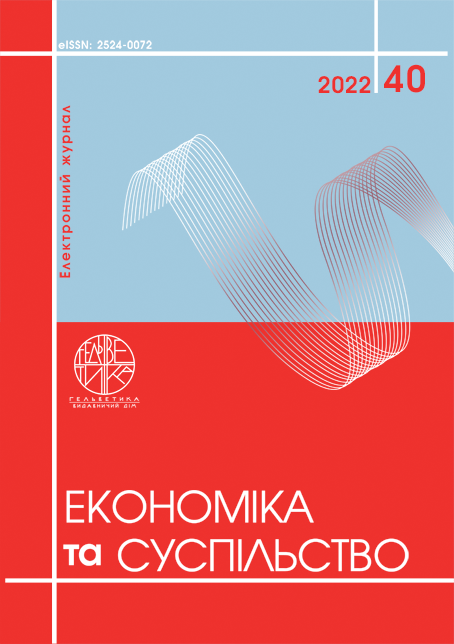ОРГАНІЗАЦІЙНА КУЛЬТУРА В СИСТЕМІ ЛІДЕРСТВА УНІВЕРСИТЕТУ
Анотація
В статті розглядається сутність та форми прояву організаційної культури університету. Доведено важливість забезпечення університетської автономії для формування організаційної культури. Проаналізовано взаємозв’язок між організаційною культурою та досягненням лідерства університетами.
Посилання
Burke, R. J. (2006). Organizational culture: A key to the success of work-life integration. In F. Jones, R. J. Burke, & M. Westman (Eds.), Work-life balance: A psychological perspective (pp. 235–260). Psychology Press.
Грішнова О., Бех С. Соціальна відповідальність університетів України: порівняльний аналіз та основні напрями розвитку. Вісник Київського національного університету імені Тараса Шевченка. Серія: Економіка. 2014. № 5 (158). С. 11–18.
Denison, D.R., Fey, C.F. Organizational culture and effectiveness: can American theory be applied in Russia. Organization science. 2004. № 6. P. 204–223.
Deal T. E. and Kennedy, A. A. (1982, 2000) Corporate Cultures: The Rites and Rituals of Corporate Life, Harmondsworth, Penguin Books, 1982; reissue Perseus Books, 2000.
Manfred F.R., Kets de Vries, Miller D. Personality, culture and organization. Available at: https://flora.insead.edu/fichiersti_wp/Inseadwp1985/85-17.pdf
Matsumoto D. Culture, Context, and Behavior. Available at: https://davidmatsumoto.com/content/2007%20Matsumoto%20JOP.pdf
Ouchi, W.G., Wilkins, A.L. Organizational culture. Available at: https://www.researchgate.net/publication/234838292_Organizational_Culture
Charles A. O’Reilly III, Jennifer Chatman & David F. Caldwell. People and Organizational Culture: A Profile Comparison Approach to Assessing Person-Organization Fit. Academy of Management Journal 34 (3) (1991): 487–516.
Schein E.H. Organizational Culture and. Leadership. 2nd ed. San Francisco: Jossey-Bass, 1992.
Гайдученко С. О. Організаційна культура. Харків : ХНУМГ ім. Бекетова, 2020. 75 с.
Ekore J. O. Impact of key organizational factors on knowledge transfer success in multinational enterprises. Management. 2014. Vol. 19. No. 2. P. 3–18.
Лепейко Т. І., Лукашев С. В., Миронова О. М. Організаційна поведінка : навчальний посібник. Харків : Вид. ХНЕУ, 2013. 156 с.
Autonomy & Governance. European University Association. Available at: https://eua.eu/issues/4:autonomy-and-governance.html
Estermann Th., Nokkala T., Steinel M. University Autonomy in Europe II. The Scorecard. – Brussels, EUA, CRASP, HRK, Univ. Denmark & Jyvaskyla, 2011. – 81 p.
University Autonomy in Europe III The Scorecard 2017. Available at: http://www.eua.be/Libraries/publications/ University-Autonomy-in-Europe-2017
Oleksiyenko A. Intellectual leadership and academic communities: Issues for discussion and research / A. Oleksiyenko, N. Ruan. // Wiley. – 2018. – С. 407.
Soltani I. (2009) Six intelligence of intelligent leadership tool. Compass, vol. 210, pp. 21–27.
Žydžiūnaitė V. Considerations on Intellectual and Academic Leadership of a Scholar in Higher Education: The Descriptive Literature Review / Vilma Žydžiūnaitė. – 2018. – Р. 36.
Temmerman Nita. What counts for effective leadership in higher education? 2021. Available at: https://www.universityworldnews.com/post.php?story=20211109103538395
Kalenyuk I., Tsymbal L., Djakona A., Panchenko E. Assessment of intellectual leadership under global competition. Problems and Perspectives in Management. 2018. N4. Volume 16. 2018, Issue 4, pp. 212–223. DOI: http://dx.doi.org/10.21511/ppm.16(4).2018
Varada Murthy K.S. Importance of Leadership in Higher Education. 2022. Available at: https://www.highereducationdigest.com/importance-of-leadership-in-higher-education/
References:
Burke, R. J. (2006). Organizational culture: A key to the success of work-life integration. In F. Jones, R. J. Burke, & M. Westman (Eds.), Work-life balance: A psychological perspective (pp. 235–260). Psychology Press.
Grishnova O., Bekh S. Social responsibility of Ukrainian universities: comparative analysis and main directions of development. Bulletin of Taras Shevchenko Kyiv National University. Series: Economy. 2014. No. 5 (158). P. 11–18.
Denison, D.R., Fey, C.F. Organizational culture and effectiveness: can American theory be applied in Russia. Organization science. 2004. № 6. P. 204–223.
Deal T. E. and Kennedy, A. A. (1982, 2000) Corporate Cultures: The Rites and Rituals of Corporate Life, Harmondsworth, Penguin Books, 1982; reissue Perseus Books, 2000.
Manfred F.R., Kets de Vries, Miller D. Personality, culture and organization. Available at: https://flora.insead.edu/fichiersti_wp/Inseadwp1985/85-17.pdf
Matsumoto D. Culture, Context, and Behavior. Available at: https://davidmatsumoto.com/content/2007%20Matsumoto%20JOP.pdf
Ouchi, W.G., Wilkins, A.L. Organizational culture. Available at: https://www.researchgate.net/publication/234838292_Organizational_Culture
Charles A. O’Reilly III, Jennifer Chatman & David F. Caldwell. People and Organizational Culture: A Profile Comparison Approach to Assessing Person-Organization Fit. Academy of Management Journal 34 (3) (1991): 487–516.
Schein E.H. Organizational Culture and. Leadership. 2nd ed. San Francisco: Jossey-Bass, 1992.
Hayduchenko S. O. Organizational culture. Kharkiv, 2020. 75 p.Ekore J. O. Impact of key organizational factors on knowledge transfer success in multinational enterprises. Management. 2014. Vol. 19. No. 2. P. 3–18.
Lepeiko T. I., Lukashev S. V., Myronova O. M. Organizational behavior: study guide. Kharkiv: Ed. Khneu, 2013. 156 p.
Autonomy & Governance. European University Association. Available at: https://eua.eu/issues/4:autonomy-and-governance.html
Estermann Th., Nokkala T., Steinel M. University Autonomy in Europe II. The Scorecard. – Brussels, EUA, CRASP, HRK, Univ. Denmark & Jyvaskyla, 2011. – 81 p.
University Autonomy in Europe III The Scorecard 2017. Available at: http://www.eua.be/Libraries/publications/ University-Autonomy-in-Europe-2017
Oleksiyenko A. Intellectual leadership and academic communities: Issues for discussion and research / A. Oleksiyenko, N. Ruan. // Wiley. – 2018. – С. 407.
Soltani I. (2009) Six intelligence of intelligent leadership tool. Compass, vol. 210, pp. 21–27.
Žydžiūnaitė V. Considerations on Intellectual and Academic Leadership of a Scholar in Higher Education: The Descriptive Literature Review / Vilma Žydžiūnaitė. – 2018. – Р. 36.
Temmerman Nita. What counts for effective leadership in higher education? 2021. Available at: https://www.universityworldnews.com/post.php?story=20211109103538395
Kalenyuk I., Tsymbal L., Djakona A., Panchenko E. Assessment of intellectual leadership under global competition. Problems and Perspectives in Management. 2018. N4. Volume 16. 2018, Issue 4, pp. 212–223. DOI: http://dx.doi.org/10.21511/ppm.16(4).2018
Varada Murthy K.S. Importance of Leadership in Higher Education. 2022. Available at: https://www.highereducationdigest.com/importance-of-leadership-in-higher-education/


